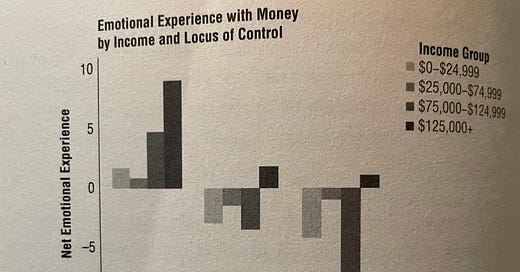I’m reading a book right now by a behavioral economist named Sarah Newcomb, Ph.D., called “Loaded: Money, Psychology, and How To Get Ahead Without Leaving Your Values Behind,” gifted to me by another financial coach friend of mine.
I am obsessed with this book. It is packed with so much good information and research. I wound up quoting a passage about an often misquoted Bible verse from it on my recent appearance on Death, Sex and Money. (Hello new subscribers who found this newsletter after that!).
There is one part of the book that I found myself sharing with four people since I read it last week. It’s about the study reflected in this graphic on page 86:
Newcomb asked (an admittedly small) cohort of 115 people the following question: “Do you believe that what happens to you is mostly the result of chance, Fate, or the like? Or do you believe that you create your own destiny?”
She was trying to gauge whether those individuals experienced an internal or external locus of control.
People with an external locus of control believe forces outside of their control dictate what happens to them.
People with an internal locus of control know that there are some things in life that they can’t control and concentrate instead on what is in their control.
“Figure 3.6 shows people’s emotional experiences with money, broken down by their views on control over their own destiny and their income group.
People in the left cluster think that they are masters of their own fate, and those on the right feel that they mostly don’t control what happens to them. Across all income ranges, people who believe that they are masters of their own fate experience mostly positive emotions concerning their money. (Newcomb, 85).”
Participants with an internal locus of control, basically Serenity Prayer adherents, tended to have a more positive experience with money than people who considered themselves at the whims of external forces.
“It would appear that having a more peaceful and positive relationship with money is not just about earning more or behaving differently, but also how we think. These results show that even if you never become rich, you can still be happy with your financial life…we can see that people who had an internal sense of destiny were experiencing peace, joy and satisfaction in their finances, while those who believed they do not control their lives felt fear, anger and sadness. (Newcomb, 86).”
I did a little more digging into external vs. internal loci of control and I stumbled upon this great explainer video by therapist Emma McAdam that revealed a few more interesting things:
Locus of control comes up in most relationship dynamics (one’s relationship with money included, apparently).
To be clear, those with an internal locus of control VERY MUCH acknowledge what is NOT in their control, they just ALSO acknowledge what is.
It can be difficult to shift from an external to an internal locus of control but isn’t impossible. She gets into a few methods for developing the latter toward the end of the video.
With the help of a YouTuber with ADHD, Emma pretty elegantly shows that admitting that external forces affect us (systemic racism, biological/psychological challenges, etc.) is a part of identifying what we can do in the face of them. Those obstacles are not excuses, but explanations, and they must be acknowledged in order to figure out what to do next.
I would love to see more research that explores the relationship between people’s feelings about their finances and their own sense of agency over their lives. But anecdotally, as a financial coach, I can see the truth in Sarah’s small study.
The clients I work with had no control over being born in America, to the family they were born into, to the environment they grew up in, to the circumstances they found themselves in, to the financial education they received, to the system they currently live in.
We can acknowledge that set of givens. Then we can take a chisel to the things about their financial life that they can immediately begin to shape. And by the end of twelve weeks, with no change to their income, they do tend to feel better.
ETC.
“Peace is found not in the absence of challenge but in our own capacity to be with hardship without judgment, prejudice, and resistance.” - bell hooks
The benefits of a “to-buy” list - Refinery29
“In times of crisis, do we all just want to go out and dance?” - Citizen Codex
‘Would winning the lottery make you happier? - Raj Raghunathan - TED-Ed
“I can find only three kinds of business in the universe: mine, yours, and God’s. (For me, the word God means “reality.” Reality is God, because it rules. Anything that’s out of my control, your control, and everyone else’s control—I call that God’s business.) Much of our stress comes from mentally living out of our own business. When I think, “You need to get a job, I want you to be happy, you should be on time, you need to take better care of yourself,” I am in your business. When I’m worried about earthquakes, floods, war, or when I will die, I am in God’s business. If I am mentally in your business or in God’s business, the effect is separation. I noticed this early in 1986. When I mentally went into my mother’s business, for example, with a thought like “My mother should understand me,” I immediately experienced a feeling of loneliness. And I realized that every time in my life that I had felt hurt or lonely, I had been in someone else’s business.” - Byron Katie




